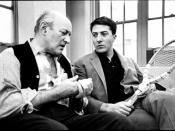Death of a Salesman
In 'Death of a Salesman' by Arthur Miller found in Perrine's Literature Structure, Sound, and Sense by Thomas R. Arp, and Greg Johnson on page 1545, Willy Loman is a man whose fall from the top of the capitalistic totem pole results in a resounding crash, both literally and metaphorically. As a man engulfed in the memories of the past and controlled by his fears of the future, Willy Loman views himself as a victim of bad luck, having little blame for all of his downfalls. However, it was not an ill-fated destiny that drove Willy to make his own life worse as well as the lives of those he loved, it was his distorted set of values.
If Willy Loman had valued the important things in life instead of the pleasures of life, he would have considered himself rich in his later years, feeling grateful to have a wife and two sons that loved him.
He didn't see these things as important as popularity and materialism. Because he was unable to appreciate the important things in life, he ultimately opted for death instead, subsequently stealing the opportunity for true happiness away from those who had managed to find their own versions of peace before his selfish act.
What is really ironic here is that the act of suicide is Willy's sick way of showing Biff that he loves him, yet he never once understands that his acceptance and understanding would have benefited his son a thousand times more than any insurance policy ever could. Even if the Loman family had succeeded in acquiring the insurance money, it would not have eased their grief. Willy's distorted perceptions of reality and what truly mattered to his family blinded him to the things that could have made him...


